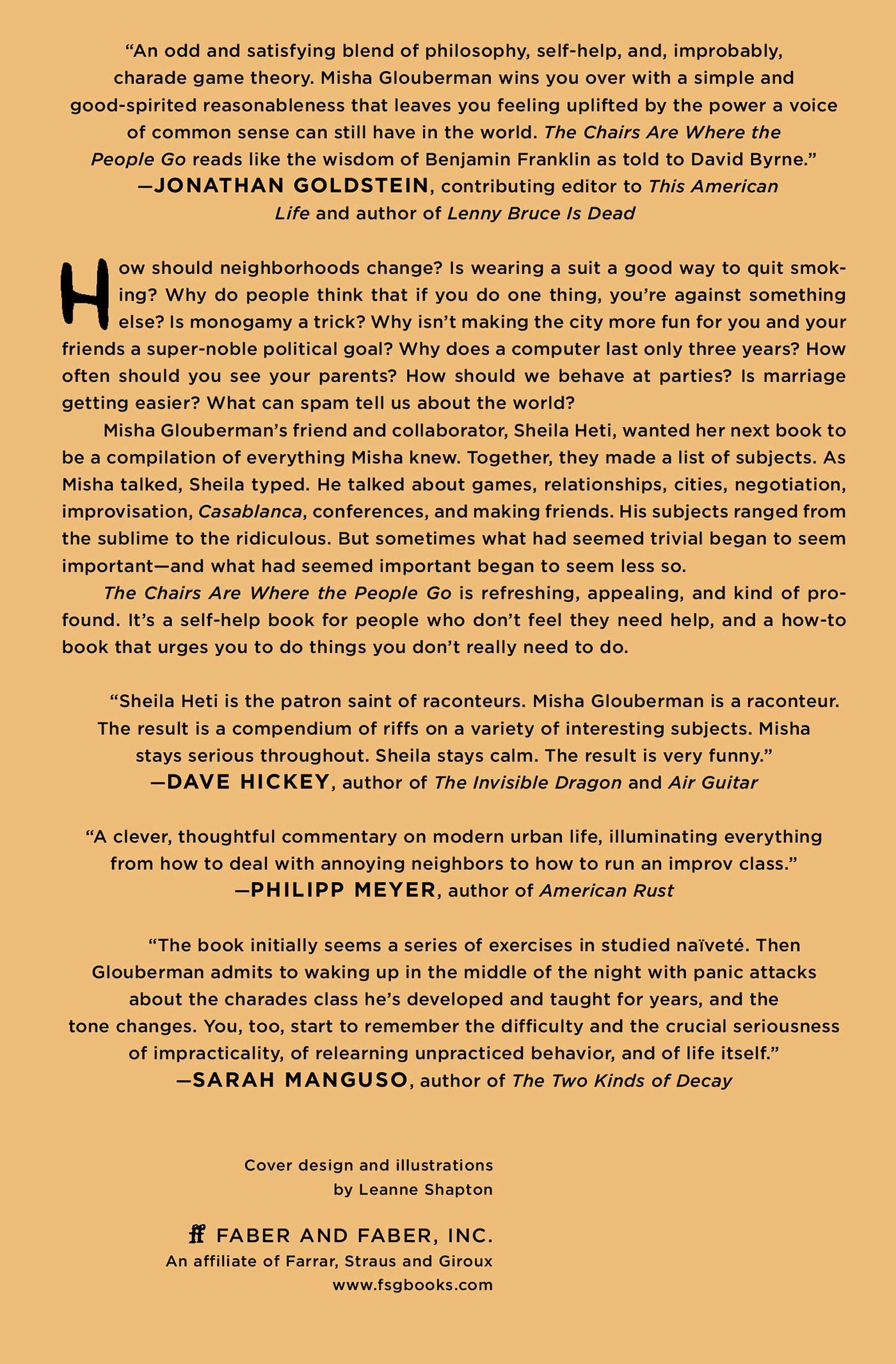


Full description not available
D**R
TALKING TO A GOOD FRIEND WHO HAS SOMETHING TO SAY
Sheila Heti is an author with three novels under her belt. Misha Glouberman is her friend. He’s a cool friend. He’s a performer and an artist: one of the things he does is facilitate performances that are kind of non-performances for other people. He lives in Toronto, which is important because some of the best pieces in this book have to do with where he lives and what it’s like living there. Misha is also, Sheila writes, a near-perfect conversationalist. He speaks in sentences that read well written down, with little or no editing.So she had this idea. She asked Misha, the best talker she knows, to talk about anything he wanted and she’d write it down. And that’s what he –they- did. This book is Misha talking about things he cares about enough to talk about them or things he knows enough about that it’s worthwhile to explain them to people who only know him through this book.The pieces are short. The longest is the last one in the book. It’s about quitting smoking and it runs six pages. Many are only one paragraph or page long. Hey! It’s a good idea! How many people do you know who once they start talking, can’t stop but just prose on, like the Little Engine That Could, until they run out of steam. Misha’s talkpieces are only as long as they need to be to say what Misha has to say. When he’s said it, he stops talking. Hurrah for Misha!Misha is a delightful companion. He’s thoughtful. He has strong views and enthusiasms but he’s not doctrinaire. The way he expresses himself is elegant though seeming casual: many of his statements just to catch it, whatever it is he’s talking about. “The best conversationalist,” he writes (in a piece entitled Storytelling Is Not the Same as Conversation), “are people who are hoping to end up somewhere they didn’t expect.” By that standard Misha does well.One of his preoccupations is with creating surprise. “Suspend[ing] the fear of failure” is how he expresses it. He conducts ‘music’ workshops where they create music that ‘s really mutually created noise –there’s no rhythm, harmony or melody. He doesn’t teach people to play instruments -- that’s a trap: henceforth you’re caught up in the Amateur Musician trap. He organizes unconferences where attendees create their own agenda by moving around and joining with other people with similar interests. Who knows better what interests the people there than they themselves? In an age of Google, why should a conference consist of hundreds of people sitting and listening to one person lecturing in front of them? He’s also somewhat skeptical about civic improvement: who benefits from banning automobiles from a market neighborhood like the one he used to live in? Why didn’t authorities talk to people who live and work there before they did it? He’s no NIMBY(Not In My Back Yard)ist: he accepts limits to what we can decide about our own neighborhoods but he thinks what the residents feel is important. It should be important to civic authorities too. Orders shouldn’t come from above without prior talking below.This book feels like talking to a wise, good friend, someone who has something to tell you but doesn’t push it. There are lots of self-help books out there. Most of them are slick: they use zippy prose to offer fatuous advice. This isn’t one of those books. What’s on display in these pages is real and good.
A**R
I would love to attend one of his charades training classes
I bought this recently for my high-school-aged granddaughter. I especially wanted her to read the chapter about going to Harvard. Also the win-win solution surrounding the noisy bar on the street. Misha has a fresh way of looking at the world that I think we could all learn from. Each "chapter" is very short, but it packs a lot to think about into each one. I would love to attend one of his charades training classes. You won't be disappointed in this little book.
D**G
a friend who knows Misha said it's best to view this as an artwork
Not everyone's cup of tea, however, a friend who knows Misha said it's best to view this as an artwork, rather than any kind of structured and coherent coda. In that way it's simple and sweet. And there's some genuine wisdom there that has come through some hard won, but surprising channels.
L**S
common sense is not so common
I'm enjoying this book and will be sharing it with friends. Grounded, yet light and approachable philosophy and style. You know when you read something and go - oh my gosh, i've thought that but could never say it so well. And then there are the parts where I'm stretched. I appreciate the insights into improvisation and miscommunication. Hopefully someday I'll bump into Misha and share a beer.
B**T
Lots of wisdom and a bit too much repetition
I liked it and I wish I could say I loved it. There's a lot of good stuff here that makes it a good book to read but some of the stuff was just too repetitive and made simple concepts too complex. Buy it-read it for the good parts. [You may like different parts than me but you can decide what is good]
D**R
I love it. A fresh way to see the world
Everyone should have this book. I love it. A fresh way to see the world.
1**I
As decribed
The book is as described, just has some minor wear, very good for the price. I would definitely buy from this seller again.
A**R
Five Stars
Words of wisdom for the everyday events that non-everyday people need help understanding.
Trustpilot
1 day ago
2 months ago